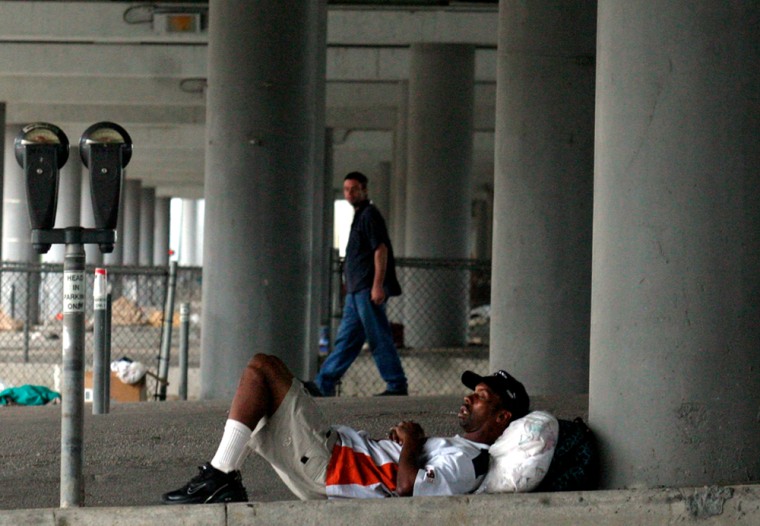America's harsh streets may be tougher for the homeless than they've ever been, according to two homeless-advocacy groups that on Wednesday released their survey of the nation's 20 “meanest” cities for the poor.
The list, compiled by the National Coalition for the Homeless and the National Law Center on Homelessness and Poverty, places Sarasota, Fla., at the top. But “mean” municipalities span the nation — from New York, San Francisco and Los Angeles to smaller cities like Flagstaff, Ariz., and Little Rock, Ark.
Four of the cities are in Texas, two are in California and two are in Arizona. All are locations that a report accompanying the list finds reflect a growing willingness over the past 25 years “to turn to the criminal justice system to respond to people living in public spaces.”
Michael Stoops, acting executive director for the homeless coalition, put it more bluntly: “There's open war on the homeless population.”
Sarasota was cited for its recent law banning lodging outdoors, passed after state courts rejected two earlier laws as unconstitutional. The report says that one of “the elements necessary for arrest under the law is that the person ‘has no other place to live.’”
Little Rock, which was No. 3, was listed for the police practice of removing homeless people from bus stations, despite their having legitimate travel plans. “Two homeless men reported that officers of the Little Rock Police Department, in separate incidents, had kicked them out of the Little Rock Bus Station, even after showing the police their tickets,” the report said.
The report, which surveyed 224 U.S. cities, paints a worsening picture for America's homeless population, a problem made more dire by Hurricane Katrina and other Gulf Coast storms last year.
Some of the report's findings:
- Criminalization of the homeless increasingly occurs in ways like making it illegal to sit, sleep or place personal belongings in a public space. Some police departments make more aggressive sweeps of areas known to be populated by the homeless.
- Twenty-seven percent of the cities surveyed prohibit sitting or lying in certain public places, a 14 percent increase over the number of cities surveyed in the groups’ last report, in 2002.
- Forty-three percent of the cities surveyed bar begging in certain public places, a 12 percent increase over 2002.
“These practices that criminalize homelessness do nothing to address the underlying causes of homelessness. Instead, they exacerbate the problem,” the report says.
Stoops finds parallels between the Reagan era and today. “The period we’re in is very similar to the early 1980s,” he said. “In downtown America, throughout the country, there's a raging debate about what to do with the homeless population.
“Whether it’s the mayor of Little Rock or the mayor of Las Vegas, they're committed to throwing out broad-stroke myths about the homeless: that they're lazy, they're criminals, that they choose their lives,” Stoops said.
Some cities have adopted the argument that the predatory aspect of life on the streets makes laws isolating the homeless from the general population necessary.
Tulin Ozdeger, civil rights staff attorney at National Law Center on Homelessness and Poverty, disagrees.
“We think there are ways to protect homeless people and those who aren’t homeless in ways other than making it criminal to sleep outside or sleep on the sidewalk,” she said.
“If the goal is to protect homeless people, increased resources for shelter space and day centers would be a good idea," Ozdeger said. "If a city can’t find that space immediately, certainly having a police presence to make sure people aren't preyed on would be valuable.”
‘Some positive things’
For Stoops, some cities get at least a B for effort. “People for the first time are talking about ending homelessness and developing 10-year plans to do so," he said. "There’s no one city getting it right. There's no city sheltering all of its homeless, but there are cities that are making progress. Key West, for example, made our ranking a few years in a row but they’ve done some positive things in the last two years.”
But cities aren't getting any help from the federal government, Stoops said, citing legislation passed in December by the House and Senate that is meant to slash Medicaid funding by $4.8 billion and trim Supplemental Security Income assistance by more than $700 million over the next five years.
“They’re talking about ending homelessness, but they’re creating more of it at the same time,” he said.
